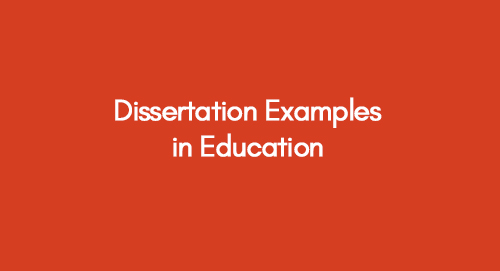
Sports Marketing Dissertation Topics | Top 130 Free Ideas in 2025
May 5, 2023
Interesting Fashion Dissertation Examples For Students
May 5, 2023Education is a vital field that plays a significant role in shaping the future of societies. As such, there is a need for rigorous research in this field to understand the complex issues and challenges facing educators, students, and policymakers. Your dissertation is a key milestone in your pursuit of an advanced degree in education.
Get 3+ Free Education Dissertation Topics within 24 hours
Find Our Quality Education Dissertation Topics Here
Effective and focused writing can achieve the dissertation goals. Here we provide a complete guide for writing dissertations in education with examples. Visit our dissertations on education examples below.
Example 1: The Effectiveness of Traditional Pedagogy in Modern Education System
Example 2: Analysing Educational Assessment Systems
You can choose any research topic from the given list, just contact us at WhatsApp or email.
What is Education Dissertation?
A dissertation in education describes a research project students undertake to tackle a particular research question or problem. Generally, dissertations are extensive and comprehensive studies in which students conduct original research using various methods.
It significantly contributes to the field of education by addressing a research gap or problem and providing new insights, knowledge, or recommendations that improve education practice or policy.
To complete an education dissertation successfully, you must have high dedication, research skills, and critical thinking. In addition to demonstrating expertise in the field of education, you can contribute to the advancement of education.
Education Dissertation Examples
As such, education research provides an understanding of the complex issues and challenges of the field. It is also essential to develop evidence-based solutions that improve educational outcomes.
For your dissertation, you can find the best examples here.
-
Primary Education Dissertation Examples
- The Impact of Parental Involvement on Student Achievement in Primary Schools
- An Investigation into the Use of Technology in Primary Education
- Exploring the Impact of Teacher-Professional Development on Student Achievement in Primary Schools
- The Impact of Classroom Design on Student Engagement and Achievement in Primary Schools
- A Study of the Effectiveness of Inquiry-based Learning in Primary Science Education
- An Exploration of the Use of Differentiated Instruction in Primary Education
-
Early Years Dissertation Examples
- An Exploration of Play-based Learning in Early Years Education
- The Impact of Parental Involvement on Early Years Education
- A Study of the Effectiveness of Phonics Instruction in Early Years Literacy Development
- An Exploration of the Use of Digital Technology in Early Years Education
- The Impact of Early Years Intervention Programs on Children's Cognitive and Social-Emotional Development
- An Exploration of Outdoor Learning in Early Years Education
-
Secondary Research Dissertation Example
- The Impact of Homework on Student Achievement in Secondary Schools
- An Analysis of the Impact of School Climate on Student Wellbeing in Secondary Schools
- A Study of the Effectiveness of Flipped Classroom Pedagogy in Secondary Education
- An Exploration of the Impact of Student-centred Learning on Student Outcomes in Secondary Education
- A Study of the Impact of School Leadership on Student Achievement in Secondary Schools
- An Analysis of the Impact of Teacher-student Relationships on Student Outcomes in Secondary Education
How to Write Dissertation Examples in Education?
Writing an education dissertation requires extensive research, planning, and organisation. A dissertation provides an opportunity for students to conduct original research and make a valuable contribution to the field.
-
Topic Selection for Education Dissertation
The topic selection process is a crucial step in writing an education dissertation. Selecting the right topic can determine the success of your research and the overall quality of your dissertation. The process of selecting a dissertation topic can be challenging and overwhelming, especially for students who are not familiar with the research process. This is why it is essential to take the time to carefully consider your options and choose an interesting and feasible topic.
-
Data Analysis for Education Dissertation
Data analysis is one of any dissertation's most significant and critical parts.
It involves using statistical techniques and methods to analyse the data collected during the research process. Analysing data help answer research questions and objectives by making sense of the data, identifying patterns and trends, and drawing conclusions.
In an education dissertation, data analysis examines various variables and factors, such as student performance, teacher effectiveness, and the impact of educational interventions. The choice of data analysis method depends on the type of data collected and the research questions being addressed.
This guide will explore key concepts and methods used in data analysis for an education dissertation.
-
Education Dissertation Literature Review
The literature review is a critical component of any education dissertation. It involves a comprehensive review of the relevant literature on the research topic, including peer-reviewed journal articles, books, reports, and other sources. It provides a context for the study and helps identify the key research questions and objectives.
-
Methodology for Education Dissertation
The methodology section of an education dissertation outlines the research design, data collection methods, and data analysis procedures used in the study. Education research methodologies include quantitative research, qualitative research, and mixed-methods research. The methodology section describes the steps taken to ensure the ethical treatment of research participants, such as obtaining informed consent and maintaining confidentiality. It also demonstrates the validity and reliability of the research findings.
-
Discussion for Education Dissertation
A research paper's discussion section provides insight into the study results and interprets them. It is important to provide a balanced discussion of the results, acknowledge both strengths and limitations and use clear and concise language to support arguments.
-
Results of Education Dissertation
The results section of an education dissertation presents the findings of the research study. This section provides a clear and concise summary of the data collected and analysed.
The results section typically includes tables, figures, and other visual aids to help present the data in a clear and understandable way. As it provides evidence to support the arguments and conclusions.
Connect With Writer Now
Discuss your requirements with our writers for research assignments, essays, and dissertations.
Education Dissertation Example: A Case Study
Topic: An Analysis of the Impact of School Climate on Student Wellbeing in Secondary Schools
Abstract:
This study examines the impact of school climate on student well-being in secondary schools in the United Kingdom. Using a mixed-methods approach to data collection, 400 students in four secondary schools across the UK. The study finds that school climate significantly impacts student well-being, with positive school climates associated with higher levels of student well-being. The study also identifies specific aspects of school climate, including teacher-student relationships, student engagement, and school safety, that are particularly important for promoting student well-being in the UK context. Despite this, the study also examines how school climate varies between schools and regions in the UK, suggesting tailor-made approaches are necessary to improve school climate and support student achievement.
Primary Objective
The primary objective is to examine the impact of school climate on student well-being in secondary schools across the United Kingdom. Specifically, the study identifies the key aspects of school climate that are most important for promoting student well-being in the UK context and explores how school climate varies across schools and regions in the UK. The research also provides insights and recommendations for policy and practice to improve school climate and promote student well-being in the UK secondary school setting.
Literature Review
The school climate positively impacts student well-being, leading to better academic outcomes, lower absenteeism, and fewer disciplinary issues. Studies show that a positive school climate includes a supportive and safe environment, positive relationships between students and teachers, and opportunities for student engagement. In contrast, a negative school climate often correlates with bullying, harassment, and lack of support. School climate is an important factor in promoting student well-being, with better teacher-student relationships, school safety, and opportunities for student engagement associated with higher levels of student well-being. Variation in school climate across schools and regions is significant, with more affluent areas reporting lower levels of school climate. This highlights the need for tailored approaches to improve school climate and promote student well-being in different contexts.
Methodology
This study analyses the impact of school climate on student well-being in secondary schools. Quantitative research methodology uses a survey questionnaire as the main data collection tool. The data use descriptive and inferential statistics. Ethical considerations for this study include obtaining informed consent from participants, ensuring anonymity, and adhering to ethical guidelines. The significance of this study is to provide insights into how school climate can influence student well-being.
Conclusion
An education dissertation summarises key findings, provides recommendations for future educational research and practice and discusses the broader implications. It restates the research questions and hypotheses, summarises the findings and how they relate to the research questions, addresses study limitations, and highlights unexpected findings. Suggestive areas for further research should be identified, and practical recommendations for educators, policymakers, and other stakeholders should be provided based on the findings.
Get an Immediate Response
Discuss your custom requirements with our writers
Free Online Plagiarism Checker For Students
We will email you the report within 24 hours.
Upload your file for free plagiarism




























